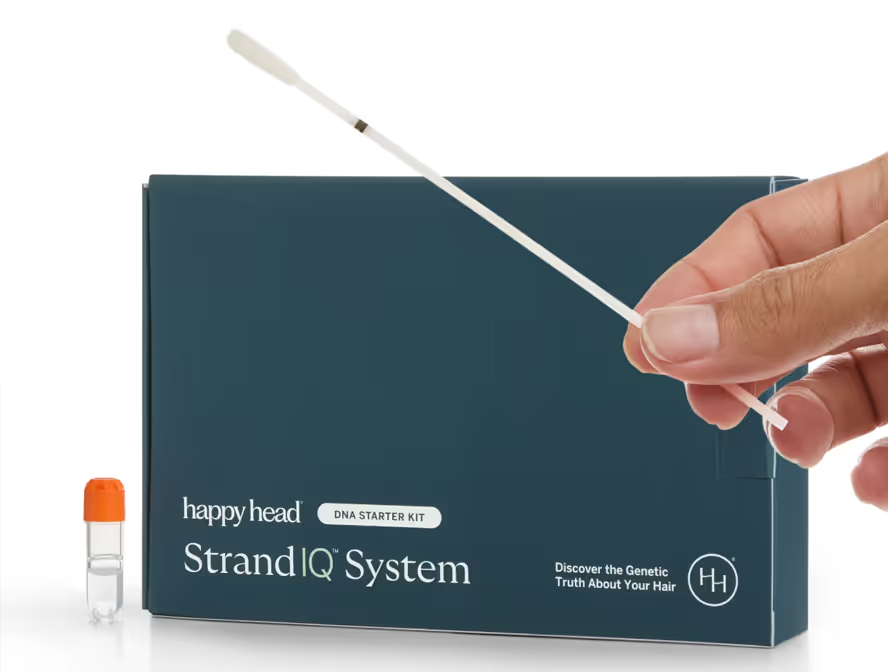Vitamin B6 plays an important role in more than just energy production. This essential micronutrient supports protein metabolism, neurotransmitter synthesis, red blood cell formation and inflammation control—all of which directly affect hair and scalp health.
It’s also a key player in the methylation cycle, the biochemical process that helps maintain DNA stability in your hair follicles. If your body has a harder time absorbing or recycling B6—which may be influenced by genetic variants—you may be more likely to experience poor scalp circulation, sluggish keratin production, and gradual hair thinning.
How B6 Metabolism Affects Scalp Health
Efficient vitamin B6 processing helps support optimal oxygen and nutrient delivery to your scalp, maintains protein-building pathways, and regulates inflammation. Without enough of it, your hair may lose strength and vitality over time.
In particular, B6 deficiency is associated with poor scalp microcirculation and low levels of keratin—the protein that makes up most of your hair strands. This can lead to dull, brittle, or thinning hair. It can also interfere with how your body responds to stress and environmental triggers.
Personalized Vitamin B6 Recommendations by Risk Level
The following suggestions are tailored to your Happy Head StrandIQ analysis identified genetic risk level and aim to support healthy vitamin B6 levels through diet, lifestyle, and professional guidance.
Low risk: Maintain through whole foods
If your StrandIQ analysis determined that you are at a low risk for vitamin B6 deficiency, then simple diet and lifestyle changes may be all you need:
- Food-first approach
Prioritize whole foods rich in vitamin B6 such as pork, peanuts, oats, soybeans, bananas and carrots. These support daily B6 needs naturally. - Watch alcohol intake
Alcohol can interfere with B6 absorption and storage, so moderate your consumption to maintain healthy levels.
Medium risk: Add support and reduce depletion
If your genetic profile has found that you are at moderate risk for vitamin B6 deficiency, or if you are unhappy with the rate at which your hair is thinning, then it may be time to implement more serious interventions:
- Boost your intake
Include more B6-rich foods like pork, peanuts, soybeans and oats in your weekly rotation. - Avoid overexercising
Intense or prolonged physical activity can deplete vitamin B6, especially if your diet isn’t compensating. - Limit alcohol use
Alcohol reduces B6 levels and may impair conversion into its active form. - Talk to a Happy Head provider
If you have digestive issues, autoimmune risk or symptoms of deficiency (like fatigue, hair shedding or irritability), talk to a health care professional about potential testing or supplementation.
High risk: Take targeted action
If your StrandIQ analysis has found that you are at a higher risk level, then you may want to consider taking more serious measures to improve your scalp health:
- Cut out alcohol
For those at high genetic risk, even occasional drinking may significantly reduce B6 bioavailability. - Avoid excess training stress
Long, frequent workouts without adequate nutritional support can suppress B6 levels. - Explore supplementation safely
If hair or scalp symptoms persist, ask your Happy Head provider about B6 supplementation. B6 is water-soluble, but large doses may lead to neuropathy if taken long-term without supervision. - Look for methylation support
Because B6 is involved in the methylation cycle, you may also benefit from a broader methylation-supportive diet rich in folate and B12.
Scalp wellness and the bigger picture
Genetic variants that impair B6 processing are just one part of the puzzle when it comes to scalp health. However, when addressed early with the right nutritional and lifestyle strategies, these risk factors can often be offset.
Whether you’re dealing with early signs of hair thinning, chronic scalp irritation or just want to support healthier regrowth, working with your personalized care team at Happy Head to optimize B6 levels is a smart and proactive move—especially if you know you’re genetically predisposed to lower absorption or faster depletion.
Resources
StrandIQ SNP Marker Count: 13
StrandIQ Genes for Trait:
ALPL, BHMT, C1orf167, CBS, DHFR, DMGDH, MSH3, MTHFD1, MTHFR, MTRR, NBPF3, PFN1P10, PON1
References:
Eussen, S.J., et al. (2010). Plasma vitamins B2, B6, and B12, and related genetic variants as predictors of colorectal cancer risk. Cancer Epidemiology, Biomarkers & Prevention, 19(10), 2549–2561. PMID: 20813848.
Hazra, A., et al. (2009). Genome-wide significant predictors of metabolites in the one-carbon metabolism pathway. Human Molecular Genetics, 18(23), 4677–4687. PMID: 19744961.
Keene, K.L., et al. (2014). Genetic associations with plasma B12, B6, and folate levels in an ischemic stroke population from the Vitamin Intervention for Stroke Prevention (VISP) Trial. Frontiers in Public Health, 2, 112. PMID: 25147783.
Li, Q., et al. (2013). Role of one-carbon metabolizing pathway genes and gene-nutrient interaction in the risk of non-Hodgkin lymphoma. Cancer Causes & Control, 24(10), 1875–1884. PMID: 23913011.
Loohuis, L.M., et al. (2018). The alkaline phosphatase (ALPL) locus is associated with B6 vitamer levels in CSF and plasma. Genes (Basel), 10(1), 8. PMID: 30583557.
Shih, V.E., et al. (1995). A missense mutation (I278T) in the cystathionine beta-synthase gene prevalent in pyridoxine-responsive homocystinuria and associated with mild clinical phenotype. American Journal of Human Genetics, 57(1), 34–39. PMID: 7611293.
Tanaka, T., et al. (2009). Genome-wide association study of vitamin B6, vitamin B12, folate, and homocysteine blood concentrations. American Journal of Human Genetics, 84(4), 477–482. PMID: 19303062.
This content, including StrandIQ™ DNA analysis reports and any Happy Head products and/or services referenced therein, is for informational and cosmetic purposes only. It is not intended to diagnose, treat, cure, or prevent any disease. This content does not constitute medical advice and should not be used to make healthcare decisions. References to prescription treatments are educational in nature. Always consult a licensed healthcare professional for any medical concerns or treatment decisions.










.avif)

